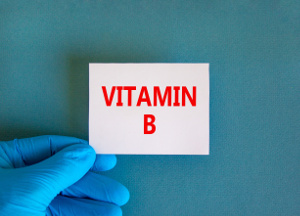Parkinson’s disease and treating the gut-brain-axis with B vitamins
 There is a close link between imbalances in the gut flora and the development of Parkinson’s disease, according to a Japanese study where scientists observed that patients with Parkinson’s disease lack certain gut bacteria that are related to the synthesis of riboflavin (vitamin B2) and biotin (vitamins B7 and B8). This results in a reduced presence of certain compounds that normally counteract leaks in the intestinal mucosa, so toxins can enter the bloodstream and reach the brain. According to the researchers, supplementation with these B vitamins may help restore the intestinal mucosa and can be useful in the prevention and treatment of Parkinson’s disease.
There is a close link between imbalances in the gut flora and the development of Parkinson’s disease, according to a Japanese study where scientists observed that patients with Parkinson’s disease lack certain gut bacteria that are related to the synthesis of riboflavin (vitamin B2) and biotin (vitamins B7 and B8). This results in a reduced presence of certain compounds that normally counteract leaks in the intestinal mucosa, so toxins can enter the bloodstream and reach the brain. According to the researchers, supplementation with these B vitamins may help restore the intestinal mucosa and can be useful in the prevention and treatment of Parkinson’s disease.
Parkinson’s disease is characterized by involuntary shaking, slow movements, stiffness, balance problems, and tiredness, which affects daily activities and quality of life. The symptoms are a result of damaged nerve cells, and it is believed that 1-2 percent of the population is affected by the disease, especially those aged 55 years and older.
It has been known for years that Parkinson’s disease may begin in the gut. A study from Århus University in Denmark has shown that the disease may be caused by harmful proteins (alpha-synuclein) that migrate from the small intestine to the brain via the bloodstream and spinal cord.
After reaching the brain, these harmful proteins aggregate, causing chronic inflammation and damage to the nerve cells and nervous system. Evidence suggests that intestinal damage can be seen up to 20 years before a Parkinson’s diagnosis is made.
The new study, which was conducted by scientists at Nagoya University in Japan and published in the journal NJP Parkinson´s Disease, sheds new light on the link between the intestine and Parkinson’s disease. It turns out that having a healthy gut flora is of vital importance to maintaining an intact intestinal mucosa and internal barrier to prevent harmful proteins from entering the bloodstream and eventually reaching the brain. Some bacteria in the intestinal flora produce certain short-chained fatty acids (SCFAs) and polyamines that preserve the intestinal mucosa, thereby keeping harmful protein out of the blood.
B vitamins and their role in the gut flora, and new therapies
To better understand the link between the gut flora and Parkinson’s disease, the Japanese researchers collected stool samples from the Parkinson’s patients, who came from Japan, the United States, Germany, China, and Taiwan. Using a technique called shotgun sequencing, the scientists were able to uncover the genetic material in the stool samples. This technique is a unique tool that gives science a better understanding of the complex gut flora and its genetic information.
Although the Parkinson’s patients from the various parts of the world had different types of gut flora, they all had a lack of bacterial genes responsible for producing riboflavin (vitamin B2) and biotin (vitamins B7 and B8).
The diet is normally the primary source of different B vitamins, but our gut flora is also able to produce several kinds of vitamin B. B vitamins plays a key role in numerous metabolic processes, including the formation of short-chained fatty acids (SCFAs) and polyamines that help to maintain an intact intestinal mucosa. With a leaky gut, harmful proteins such as alpha-synuclein can reach the brain, aggregate, and cause chronic inflammation, which can eventually lead to cell damage and neurological diseases like Parkinson’s disease.
Also, riboflavin and biotin are believed to have anti-inflammatory properties, which means they can counteract the type of inflammation that is seen in the nervous system in patients with Parkinson’s disease. The Japanese study sheds a whole new light on the essential link between gut flora, metabolic processes, and neurodegeneration. Supplementation with the different B vitamins may therefore be relevant as a way of preventing the disease or slowing down its progression. In the future, it would be ideal to restore the gut flora of Parkinson’s patients to help improve their endogenous vitamin B synthesis.
Sources of B vitamins and reasons why people are deficient
B vitamins are primarily found in coarse foods such as wholegrains, vegetables, nuts, and kernels. There is also B vitamin in meat, liver, fish, eggs, and dairy products. B12, however, is only found in animal food sources. B vitamin deficiencies may be a result of unbalanced diets, stress, low stomach acid, alcohol abuse, diuretics, antacids, and certain other types of drugs. Antibiotics and sulfa drugs can also disrupt the intestinal microflora, thereby impairing the body’s absorption and endogenous synthesis of B vitamins.
References:
Hiroshi Nishiwaki et al. Meta-analysis of shotgun sequencing of gut microbiota in Parkinson´s Disease. NPJ Parkinson´s Disease. 2024
Nagoya University. Treating the gut-brain connection with B vitamins to treat Parkinson´s Disease. ScienceDaily 2024
Zhijie Wan et al. Intermediate role of gut microbiota in vitamin B nutrition and its influences on human health. Frontiers in Nutrition 2022
Mette Louise Ohana. Parkinsons kan starte i tarmen. Århus Universitet. Nyheder. 2019
TIP! See also the related articles
Search for more information...
- Created on .








